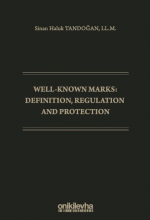 Trademarks and service marks have become indispensable for entities in today's world as they add value to their proprietors' business and reputation. Thanks to advancements in telecommunication and online advertising technologies, the use and dissemination of these marks have become easier and more widespread. This, however, also had a negative impact on marks, in that, it became easier to take unfair advantage of such marks, even more so, if these are well-known marks.
In line with this, a special protection regime is granted to well-known marks, by national, regional and international legal instruments such as the Paris Convention and the TRIPS Agreement. These have been drafted in a way that confers well-known marks a special position among other marks in the sense that they are held exempt from principles such as the principles of territoriality, class-based protection and the requirement for the mark to be registered to obtain protection, to some extent. This work focuses on what constitutes a well-known mark, how they are exempt, to some extent, from the above principles and how they are regulated and protected in various legal contexts.(ARKA KAPAKTAN)
Trademarks and service marks have become indispensable for entities in today's world as they add value to their proprietors' business and reputation. Thanks to advancements in telecommunication and online advertising technologies, the use and dissemination of these marks have become easier and more widespread. This, however, also had a negative impact on marks, in that, it became easier to take unfair advantage of such marks, even more so, if these are well-known marks.
In line with this, a special protection regime is granted to well-known marks, by national, regional and international legal instruments such as the Paris Convention and the TRIPS Agreement. These have been drafted in a way that confers well-known marks a special position among other marks in the sense that they are held exempt from principles such as the principles of territoriality, class-based protection and the requirement for the mark to be registered to obtain protection, to some extent. This work focuses on what constitutes a well-known mark, how they are exempt, to some extent, from the above principles and how they are regulated and protected in various legal contexts.(ARKA KAPAKTAN)
TABLE OF CONTENTS
I. Introduction
II. Trademarks, a General Overview
A. A Brief History of Trademarks
B. Definition, Purpose and Overview
C. The Need for Trademarks
D. Trademarks vs Service Marks
E. Certification Marks vs Collective Marks
F. Registered vs Unregistered Trademarks
1. Unregistered Trademarks
2. Registered Trademarks
G. Relevant National, Regional and International Legislation
1. National Legislation on Trademarks
2. Regional Law on Trademarks
3. International Laws Regarding Trademarks in General
III. Well-Known Trademarks
A. Definition and Overview
B. Criteria for Being Recognized as a Well-Known Trademark
1. Brief Overview and Doctrine
2. The WIPO Criteria
3. Other Criteria Suggested in the Doctrine
4. The Approach and Criteria Suggested in the Turkish Doctrine
5. Other Criteria to be Taken into Account
IV. Special Protection Granted to "Well-Known Trademarks and Service Marks"
A. Rationale Behind the Special Protection
B. Territoriality
C. Class-Based Protection
D. The Requirement for the Mark to be Registered
E. Some Unlawful Acts to be Protected Against
1. Trademark Piracy
2. Counterfeiting
3. Dilution
V. The Protection of Well-Known Marks in Various Legal Contexts
A. The Paris Convention
B. The TRIPS Agreement
C. Protection under Turkish Law
D. Well-known Marks in Selected Judgements and Decisions
VI. Conclusion
BIBLIOGRAPHY
